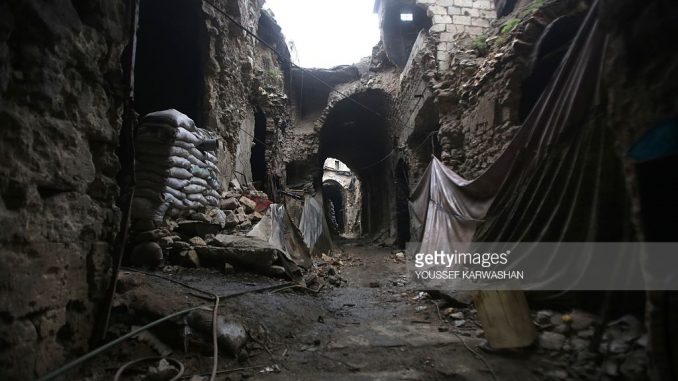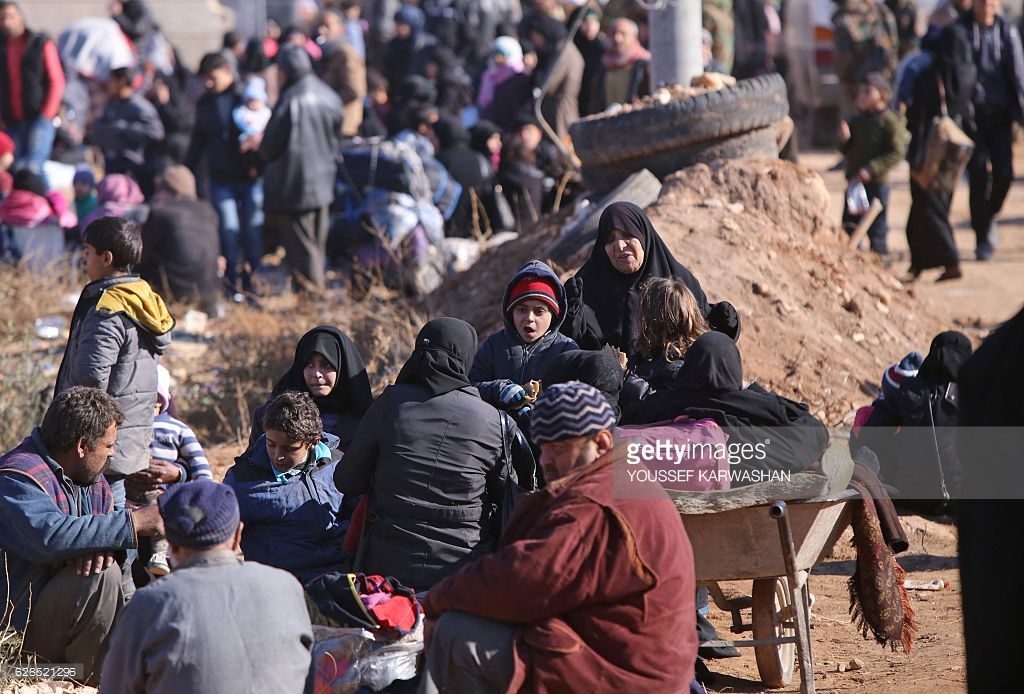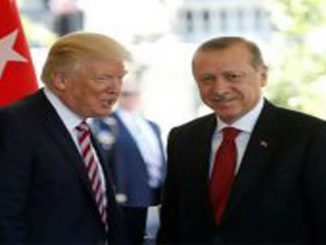
Assad regime forces renewed shelling on the last holdouts of rebel-held eastern Aleppo, ending a ceasefire agreement that was made the day before to end the battle in the city and allow rebels with civilians to evacuate, as fears rose of Iranian intention to commit more massacres in the city.
After months of crippling siege, starvation policy, daily bombardment, fierce clashes and bloody massacres the Assad regime and its allies were able to oblige the rebels in Aleppo to surrender and make an agreement to leave the area they have been holding since 2012 after losing more than 90% of it.
The ceasefire agreement was a result of talks between Russia, Assad’s main ally, and Turkey, a leading backer of the rebels, a Turkish government official said. The guns fell silent late on Tuesday in Aleppo. A Reuters reporter in the city said no blasts had been heard after days of near constant bombardment.
By taking full control of Aleppo, Assad has proved the power of his military coalition, aided by Russia’s air force and an array of Shi’ite militias backed by Iran after his rule was close to ending after major losses in 2015.
On Wednesday morning, buses and ambulances were brought to evacuate rebel fighters and their families – only to be turned away shortly afterward. as the ceasefire fell apart.
Tens of thousands of civilians remained trapped without food, water or medicine under a hail of artillery and airstrikes on Wednesday after Iranian-backed militia who had spearheaded the ground assault on eastern Aleppo defied the ceasefire agreement.
The evacuation of fighters and civilians to Idlib province had been intended to begin on Wednesday morning, but buses intended to transport them – decorated with posters of the Syrian president, Bashar al-Assad – returned to their depots empty hours later as the Iranian-backed militias refused to allow the evacuation to proceed.
“Iran has prepared to invade our besieged areas and has defied Russia’s agreement,” said Yasser al-Youssef, a spokesman for the Noureddine al-Zenki rebel group.
Marwan Kabalan, a Syria analyst and associate political analyst at the Doha Institute, said the ceasefire breach may signal growing differences between Russia and Iran.
“The Russians seem to be bowing to international pressure in order to make the truce hold,” he said.
“It’s clear the Iranians have a different opinion here … I think they believe that they are winning and must finish off the opposition, rather than allow them to leave the city alive. The Syrian regime seems to be closer to the Iranian position,” he said, describing eastern Aleppo’s fall as a “major blow” to opposition forces.
HUMANS ALL OVER THE WORLD, DO NOT STOP! ONLY YOU CAN DO SOMETHING.
TO THE STREETS NOW!#StandWithAleppo#ToTheStreetsNow pic.twitter.com/ioDgBgxJkY— Lina shamy (@Linashamy) December 14, 2016
Forced displacement
Explaining that civilians were scared the evacuation could be delayed further, an activist said: “No one knows what the regime will do.”
“People here are shocked [by the delay],” he said. “We didn’t sleep last night waiting to leave.”
Doctors and other civilians, who hours earlier had expressed optimism that they would be able to evacuate eastern Aleppo, again implored the international community to put a stop to the fighting that had left their homes in ruins and allow them to seek a safe haven elsewhere.
“We will always remember and never forget how the criminals of the world forced Aleppo’s people to choose between two options, collective death or collective forced displacement, and we chose the lesser of the two crimes,” said one activist in a besieged opposition-held district.
The evacuation of rebel-held eastern Aleppo would, however, mean the opposition would cede the city, the last significant urban stronghold where it maintained an active presence.
Civilians left in the opposition districts have been posting farewell messages on social media as the Iranian-backed militias and forces loyal to Assad rampaged through newly reclaimed neighborhoods in what the UN described as a “meltdown of humanity”.
The civilians in Aleppo lived through all kinds of fear in the past days. Fear of death in the hell their neighborhoods were turned into, fear of being arrested and tortured after fleeing to the regime-controlled areas, and at last the fear of being raped or executed by Assad regime and his allied militias after rebels’ withdrawal.
After their escape, the men were abducted by Assad regime and moved to unknown areas.
Many predicted they would either die once the regime’s forces reached their homes, or would be detained and tortured if they gave themselves up to them.
“Save us, people. Save us, people, world, anyone who has even a bit of humanity,” said one doctor in a voice message from a besieged district. “We beg you, we beg you, the dead and wounded are in the streets and people’s homes have collapsed on top of them. Save us. Save us.”
Another resident said: “We want to leave. We don’t want more massacres, let us leave. What is happening?”
Resumed bombing
Residents said the bombardment on Wednesday, with artillery and airstrikes as well as alleged use of cluster bombs, had resumed at a pace greater even than before the ceasefire deal.
“There is artillery [being fired] now … as I speak,” Zouhir Al Shimale, a journalist in east Aleppo, said on Wednesday.
“There aren’t any clashes,” he said, explaining rebel groups were not fighting at the moment. “There are injuries, but we don’t know how many. We can’t go outside because the shelling is indiscriminate.”
Medical sources said cluster munitions were used in al-Zubdiyeh neighbourhood and elsewhere in the remaining rebel-held areas.
Pounding the east of #Aleppo with dozens of artillery bombs since one hour until now we have counted more than 100 bombs.#Stand4Aleppo pic.twitter.com/1EG68WdpQV
— Zouhir_AlShimale (@ZouhirAlShimale) December 14, 2016
It's night now but the warplanes still flying over us dropping cluster bombs randomly
Many death & injuries
No one left#Save_Aleppo#Aleppo— Zouhir_AlShimale (@ZouhirAlShimale) December 14, 2016
Aleppo Media Center activist Salah Ashkar said earlier that shelling was ongoing in his neighborhood, and posted a video to Twitter showing walls in his building damaged and rubble all over the rooftop.
“A missile just fell on the roof of my building,” he said in the video. “Now the people who were waiting (for) the buses have to run back for their lives again (to) find shelter.”
“The wounded and dead are lying in the street,” one activist, Mohammad al-Khatib, told AFP. “No one dares to try and retrieve the bodies.”
UN High Commissioner for Human Rights Zeid Ra’ad Al Hussein said he was appalled by the ceasefire agreement’s swift collapse.
“While the reasons for the breakdown in the ceasefire are disputed, the resumption of extremely heavy bombardment by the Syrian government forces and their allies on an area packed with civilians is almost certainly a violation of international law and most likely constitutes war crimes,” he said in a statement Wednesday.
Breaking: Video document one of 10 shells falling on the besieged neighborhoods of #Aleppo, in attempt from #Iranian to broke the Truce pic.twitter.com/9o5IicMimJ
— Ahmad Alkhatib (@AhmadAlkhtiib) December 14, 2016
Aleppo became a slaughterhouse
“Save us, people. Save us, people, world, anyone who has even a bit of humanity,” said one doctor in a voice message from a besieged district. “We beg you, we beg you, the dead and wounded are in the streets and people’s homes have collapsed on top of them. Save us. Save us.”
“This is an urgent distress call,” said another doctor.
“Save the besieged districts of Aleppo. Since the early morning, the shelling has targeted all the besieged neighbourhoods with all types of weaponry. The dead are in the street, and so are the wounded, and there are no ambulances. Save Aleppo. An urgent distress call to every free person in the world.”
Another nurse, whose father and brother were killed on the same day earlier in the regime’s offensive, pleaded that civilians be spared. “A lot of shells and bombs are falling on us, no one can walk in the streets,” he said in a voice message. “Hundreds of shells and rockets. Please let us stay alive. Please pressure the regime to keep us safe. Please, from Aleppo, the last call.”
https://twitter.com/AhmadAlkhtiib/status/809101440769728517
Another Holocaust is looming
TAKE ACTION
مذبحة جديدة تلوح في الأفق
تحرك ..#for_Aleppo#standwithaleppo pic.twitter.com/w95kfp0FZb— Ahmad Alkhatib (@AhmadAlkhtiib) December 14, 2016
Capturing eastern Aleppo is the biggest victory for Assad regime since the start of the revolution against him in 2011, restoring his control over the whole city apart from a Kurdish-held area that has not fought against him.
It is a victory for his allies, Russia and Iran, which have outmaneuvered the West and Assad’s regional enemies through direct military intervention.
For Assad regime, taking back Aleppo will help its forces focus on ending the remaining rebels-held areas. These areas include the rebels’ stronghold in Idlib in addition to isolated areas in rural Damascus, Homs, and Hama.
These areas have been under daily bombardment and crippling siege for years. The Old city of Homs and parts of rural Damascus has already been lost to Assad regime, and the remaining areas are expected to follow.
As a conclusion, defeating the rebels and retrieving Aleppo means destroying the last major resistance stronghold of the Syrian rebels and will lead eventually to the victory of Assad regime and ending the Syrian revolution.
The fate of rebel-held Aleppo spells the abject failure of the west’s contradictory and piecemeal policies. It is a humiliation for the UN. Its fall will be an unequivocal victory for Russian strategy, and the shameful and humiliating defeat for all those who said they stand with the civilians and left them to face annihilation including US, Turkey and all Arab states.
Aleppo will join an infamous list of cities whose names are synonymous with mass crimes committed while the world looked impotently on: Srebrenica, Grozny, even Guernica.




